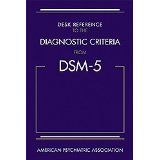DSM
Alternative to the New DSM V
Move focus from diagnosis to causes of chronic illness
Posted June 21, 2013

DSM V
The release of the DSM V has stirred a national dialogue about psychiatry and its definitions of mental illness. As a Clinical Professor of Psychiatry, practitioner of Whole Psychiatry, and certified Psychopharmacologist, I propose a companion, if not an alternative to the DSM V.
I suggest that we psychiatrists abandon our obsession with linear, categorical thinking, and our neuro-centric assumptions that the biological aspects of human behavior are primarily based on neuronal function and neurotransmitters. Clinical science has proven that all brain functions—
cognitive, emotional and vegetative functions—are inseparable from bio-psycho-social systems. Therefore, a systems approach to mental health, which considers the interactive nature of each of the bodily systems is the most scientifically sound.
Note these three scientific facts:
1. The brain has more immune cells than neurons. These brain microglia react to inflammatory processes in the body, such as infection and digestive disorders. Once affected, these cells change the levels of hormones such as melatonin (sleep) and cortisol (stress response), as well as brain neurotransmitters.
2. Specific nutrients are known to turn on and turn off certain genes relevant to mental health. This means that your grandparents’ nutrition and stress, years before they ever conceived your parents, shape the expression of your brain function and mental health decades later.
3. All of the systems which affect mental health are also at the root of the chronic illnesses which threaten our health care system (e.g., diabetes, heart disease). Thus people who have diabetes, for example, are much more likely to also have a psychiatric disorder such as depression.
I propose that rather than the sole focus of diagnosis being on finding the correct diagnostic label, clinicians focus on antecedents of chronic illness, such as, genetics, childhood stress, socio-economics, nutrition, and lifestyle triggers (e.g., job loss, divorce), and the communication molecules—hormones and neurotransmitters—which act as mediators.

Data-driven treatment for psychiatric conditions
Detailing the chronology of a person's illness, and then addressing the matrix of variables contributing factors, as noted above, results in a more realistic and, most importantly, a more effective model. A thorough systems approach guides one toward more data-driven interventions, which address and treat the roots of illness, rather than the label, the neurotransmitter, or the pill du jour.


